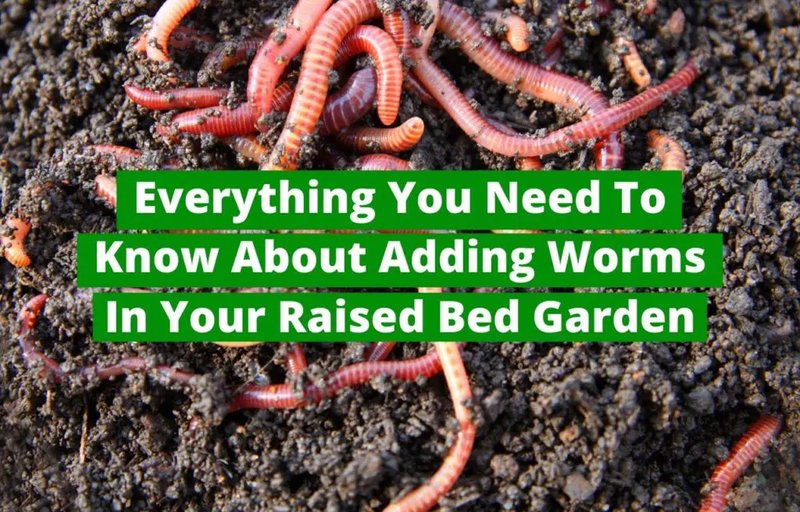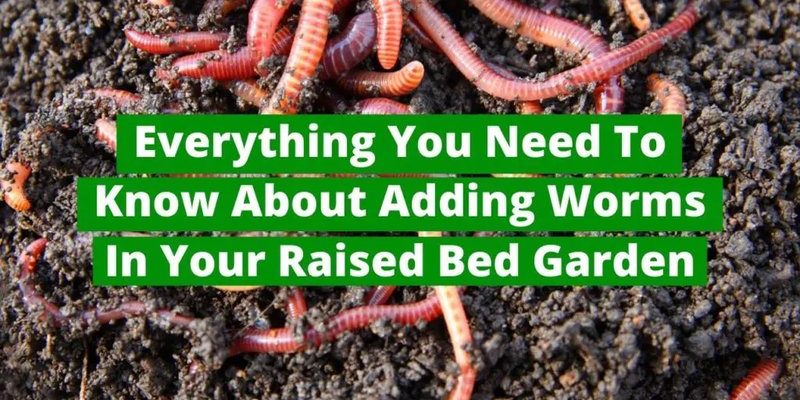
Think of a raised garden bed as a cozy apartment for your plants. It’s elevated, often filled with nutrient-rich soil, and designed to help your plants thrive. But does that same environment suit earthworms? After all, these creatures have specific needs when it comes to their home sweet home. Let’s dig deeper and see how well earthworms fare in raised garden beds.
What Exactly Are Raised Garden Beds?
Raised garden beds are essentially frames filled with soil that sit above the ground. They can be made from various materials like wood, stone, or even bricks. Imagine building a tiny fortress for your plants, where you control the soil quality, drainage, and even the pests.
These beds can range in height, width, and length, giving you the freedom to customize according to your garden’s needs. One of the main reasons people love raised beds is that they allow for better drainage and warmer soil in the spring. Plus, less bending means less strain on your back, making gardening a lot more enjoyable.
So, since raised beds offer such a great environment for plants, a question naturally arises: do they offer the same perks for earthworms?
Do Earthworms Actually Live in Raised Garden Beds?
Yes, earthworms absolutely can survive in raised garden beds! In fact, they can thrive in this type of environment if the conditions are right. Raised beds usually have well-aerated soil, which earthworms love. They need air pockets in the soil to breathe, just like we do!
Earthworms play a key role in breaking down organic matter, creating nutrient-rich castings that help improve soil fertility. Raised beds often contain rich compost and organic materials, providing an ideal buffet for earthworms. So, if your raised bed is filled with the right stuff, these little critters will probably call it home.
You might be wondering, “Can they get in there?” That’s the beauty of it. Earthworms can burrow into the soil from the ground below or even be added through compost. So, whether you have a naturally worm-friendly setup or you introduce them yourself, they can easily adjust to life in a raised bed.
What Do Earthworms Need to Survive?
Just like any living creature, earthworms have specific requirements for survival. Here’s what they need to thrive:
- Moisture: Earthworms are quite sensitive to moisture levels. They need a damp environment but not drowning in water. Too dry, and they can desiccate; too wet, and they might drown.
- Food: These worms munch on decaying organic matter, like leaves, fruit peels, and compost. A rich mix of organic material in your raised bed will keep them happy and healthy.
- Adequate space: Earthworms are burrowing creatures, and they require soil that allows them to move freely. A well-draining raised bed with loose soil meets this need perfectly.
If you can provide these essentials, your earthworms will likely flourish and help make your garden soil even more nutritious. Honestly, having earthworms is like having a built-in composting system working day and night!
Using Earthworms to Improve Soil Health
If you’re thinking about growing plants in a raised garden bed, incorporating earthworms into your soil can be a game changer. Here’s how they can help:
1. **Soil Aeration:** As earthworms burrow, they create tunnels in the soil that allow air and water to reach plant roots more easily. It’s like giving your plants a breath of fresh air!
2. **Nutrient Recycling:** Earthworms break down organic matter into smaller particles, which makes it easier for plants to absorb nutrients. Think of them as tiny recyclers turning waste into something valuable.
3. **Soil Structure:** Their burrowing activities improve soil structure, making it more crumbly and loamy. This helps with drainage and root development, leading to healthier plants.
If you want to encourage earthworms in your raised bed, consider adding worm castings or homemade compost to the soil. Not only will this promote earthworm populations, but it’ll also provide immediate benefits to your plants.
Common Concerns About Earthworms in Raised Beds
Even though earthworms can thrive in raised garden beds, there are some concerns gardeners might have. Let’s tackle those:
1. **Heat Sensitivity:** Raised beds can heat up quickly in the sun, which might be too hot for earthworms. If you notice that your raised bed gets excessively hot, consider using shade cloth or planting taller plants to provide some relief.
2. **Overwatering:** Since raised beds drain well, it’s important not to overwater. Constantly soggy soil can drown earthworms. Monitor moisture levels and adjust your watering practices accordingly.
3. **Soil Quality:** If too much chemical fertilizer is used, it could harm earthworms. To keep them thriving, opt for organic fertilizers and compost to provide nutrients without causing harm.
Being mindful of these points can help ensure that your raised garden bed remains a sanctuary for earthworms, which can ultimately enhance your garden’s health.
Tips for Encouraging Earthworms in Your Raised Garden Beds
So, how can you attract and keep earthworms happy in your raised garden bed? Here are some friendly tips:
- Mulch regularly: Adding a layer of organic mulch, like straw or shredded leaves, can provide a food source for earthworms and help retain moisture.
- Compost: Regularly mixing compost into the soil not only nourishes your plants but also creates a delicious buffet for earthworms.
- Plant cover crops: Growing plants such as clover or vetch can provide additional food and habitat for earthworms, especially during off-seasons.
By following these tips, you can create an inviting environment for earthworms, contributing to a healthier garden that thrives with life.
In summary, earthworms can definitely survive and even thrive in raised garden beds. With the right conditions—like moist, well-aerated soil and plenty of organic matter—these squiggly helpers can bring immense benefits to your garden. Think of them as your garden’s little laborers, tirelessly working to keep the soil rich and healthy.
By understanding their needs and taking steps to create a welcoming environment, you’ll not only be helping earthworms but also encouraging a flourishing garden. So, the next time you’re tending to your raised bed, remember these little friends beneath the surface—they’re doing more for your plants than you might realize!

